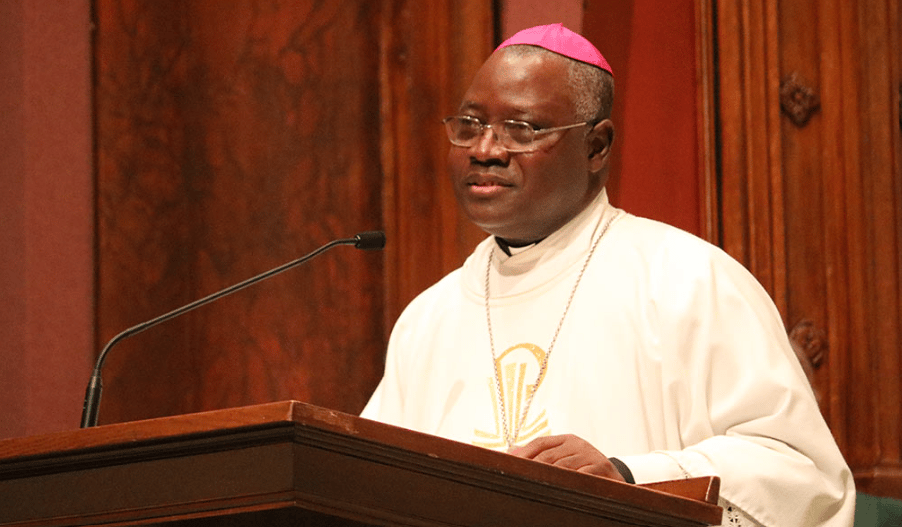YAOUNDÉ, Cameroon – Following the kidnapping of two Catholic priests in Nigeria on Feb. 1, a leading prelate said the increasingly dangerous climate in Africa’s most populous nation, especially for Christians, are putting the country’s security apparatus “to shame.”
“Increased insecurity continues to haunt our nation,” said Archbishop Ignatius Kaigama of Abuja, the national capital. “Boko Haram insurgents, herdsmen militia, bandits, kidnappers and the so-called ‘unknown gunmen’ continue to unleash terror in different parts of the country.”
Kaigama, 65, put the blame squarely on the federal government, which he said has failed to protect the people –a government, Kaigama said, that “has lost the capacity to rein in the perpetrators of violence who now terrorize the people in different parts of the country at will.”
The most recent kidnappings are simply the latest in a long string of such incidents in Nigeria.
According to a Feb. 2 statement from the Congregation of Missionaries Sons of the Immaculate Heart of Mary (CMF), also known as Claretian Missionaries, the night before Father Kenneth Kanwa and Father Jude Nwachukw were abducted from the rector of the parish where they served in Nigeria’s Plateau State, which has long seen violent conflicts between largely Muslim herders and mostly Christian farmers.
Father Dominic Ukpong, Provincial Secretary of the Claretian order to which the two priests belonged, urged prayers.
“We solicit your prayers at this challenging time for their safety and quick release from captivity,” Ukpong said. “May the Most Blessed Virgin Mary intercede for the sons of her Immaculate Heart.
Experts have described the phenomenon of kidnappings in Nigeria as “an epidemic.”
Figures from a consortium of civil society organizations known as the Civil Society Joint Action Group reveal that 17,469 Nigerians have been abducted since 2019.
Speaking at a press conference in Abuja on Monday on behalf of the group, the Executive Director of the Civil Society Legislative and Advocacy Centre, Auwal Musa Rafsanjani, added that 2,423 persons have been killed while 1,872 others had been abducted since the inauguration of President Bola Tinubu in May 2023 alone.
In exclusive comments to Crux, Kaigama said the wave of kidnappings and killings is evidence of the systemic failure of the country’s security apparatus.
“Kidnappers in particular have put the Nigerian security establishment to shame,” he said. “They work at will, publicly demand ransoms, and even that does not ensure safety or the return of the kidnapped individuals.”
Kaigama said the current spike in kidnappings and banditry “seems to be pushing Nigerian brinkmanship to the breaking point.”
Archbishop of Abuja since 2019, Kaigama complained that rising insecurity is making it harder for Nigeria to grow as a country, because it “deters both domestic and foreign investment. Farmers are unable to visit their farms. In some regions of the nation, traveling requires a leap of faith. The security establishment is at its wit’s end, and needs all hands-on deck to deal with the issues as soon as possible.”
He said it is evident Tinubu’s administration “is yet to fully take the required actions to guarantee that terrorists are neutralized, criminals are arrested, bandits are vanquished, and kidnappers are pushed out of business.”
“At the very least, this is what the people look to their leaders for. The proliferation of diverse ‘self-help’ security groups is a glaring sign that the public no longer have confidence in the authorities,” Kaigama said.
He said it would be critical to address the root causes of the nation’s kidnappings and banditry, but this would require “a concerted effort and combination of tactics.”
Without such concerted action, the Abuja archbishop told Crux that Nigeria faces “a real and present risk of a collapse in public safety and order.”
Kaigama nonetheless expressed optimism that Nigeria can come back from the brink.
“We continue to insist that the government has a constitutional and statutory duty of protecting human rights and securing basic justice for all,” he said. “The role of government is to guarantee the minimum conditions that make human rights and justice possible. “
“It should be clear to the president that there is a serious need of building a robust security apparatus that can checkmate the onslaught of these terrorists and criminals,” Kaigama told Crux.
He cautioned Nigerians to give the president “some leeway to work out his plans and initiatives as he has only recently taken office. Consequently, at this early point, it would not be appropriate to forecast doom and gloom or dire consequences for the country.”












